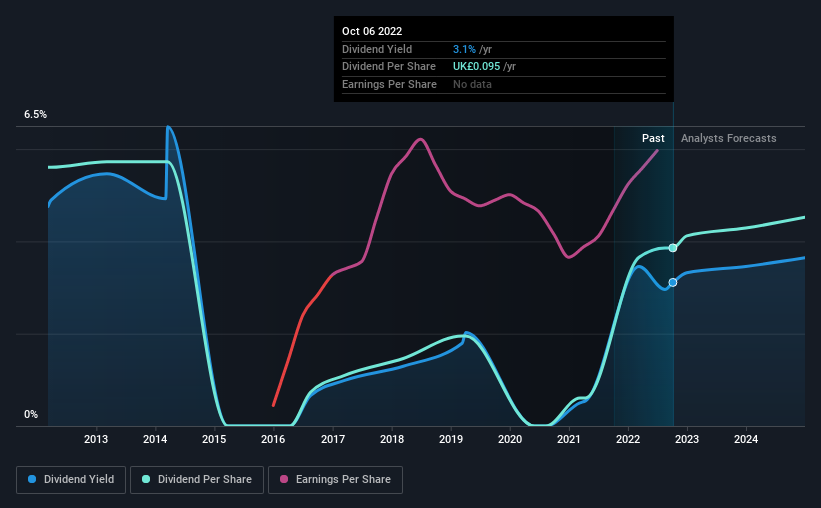
Balfour Beatty plc (LON:BBY) will increase its dividend from last year's comparable payment on the 5th of December to £0.035. Although the dividend is now higher, the yield is only 3.1%, which is below the industry average.
View our latest analysis for Balfour Beatty
Balfour Beatty's Dividend Is Well Covered By Earnings
If it is predictable over a long period, even low dividend yields can be attractive. However, Balfour Beatty's earnings easily cover the dividend. As a result, a large proportion of what it earned was being reinvested back into the business.
Looking forward, earnings per share is forecast to rise by 16.9% over the next year. If the dividend continues along recent trends, we estimate the payout ratio will be 31%, which is in the range that makes us comfortable with the sustainability of the dividend.

Dividend Volatility
The company's dividend history has been marked by instability, with at least one cut in the last 10 years. The annual payment during the last 10 years was £0.138 in 2012, and the most recent fiscal year payment was £0.095. The dividend has shrunk at around 3.7% a year during that period. Generally, we don't like to see a dividend that has been declining over time as this can degrade shareholders' returns and indicate that the company may be running into problems.
The Dividend Looks Likely To Grow
Given that the dividend has been cut in the past, we need to check if earnings are growing and if that might lead to stronger dividends in the future. Balfour Beatty has impressed us by growing EPS at 56% per year over the past five years. A low payout ratio gives the company a lot of flexibility, and growing earnings also make it very easy for it to grow the dividend.
We Really Like Balfour Beatty's Dividend
Overall, a dividend increase is always good, and we think that Balfour Beatty is a strong income stock thanks to its track record and growing earnings. Distributions are quite easily covered by earnings, which are also being converted to cash flows. All of these factors considered, we think this has solid potential as a dividend stock.
Companies possessing a stable dividend policy will likely enjoy greater investor interest than those suffering from a more inconsistent approach. Still, investors need to consider a host of other factors, apart from dividend payments, when analysing a company. To that end, Balfour Beatty has 3 warning signs (and 1 which is potentially serious) we think you should know about. Looking for more high-yielding dividend ideas? Try our collection of strong dividend payers.
Valuation is complex, but we're here to simplify it.
Discover if Balfour Beatty might be undervalued or overvalued with our detailed analysis, featuring fair value estimates, potential risks, dividends, insider trades, and its financial condition.
Access Free AnalysisHave feedback on this article? Concerned about the content? Get in touch with us directly. Alternatively, email editorial-team (at) simplywallst.com.
This article by Simply Wall St is general in nature. We provide commentary based on historical data and analyst forecasts only using an unbiased methodology and our articles are not intended to be financial advice. It does not constitute a recommendation to buy or sell any stock, and does not take account of your objectives, or your financial situation. We aim to bring you long-term focused analysis driven by fundamental data. Note that our analysis may not factor in the latest price-sensitive company announcements or qualitative material. Simply Wall St has no position in any stocks mentioned.
About LSE:BBY
Balfour Beatty
Balfour Beatty plc finances, designs, develops, builds, and maintains infrastructure in the United Kingdom, the United States, and internationally.
Undervalued with adequate balance sheet.
Similar Companies
Market Insights
Community Narratives


